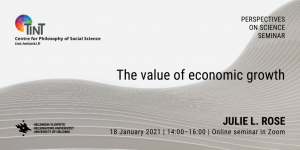
At the next PoS seminar on Monday 18.1., Julie L. Rose (Dartmouth College) will be giving a presentation titled “The value of economic growth”. The seminar takes place in Zoom from 2 to 4 pm.
Perspectives on Science is a weekly research seminar which brings together experts from science studies and philosophy of science. It is organized by TINT, the Centre for Philosophy of Social Science at the University of Helsinki. More information about the seminar here.
To join the seminar please contact tatu.nuotio@helsinki.fi for the Zoom invitation.
Author bio:
Must a society aim indefinitely for continued economic growth? Proponents of economic growth advance three central challenges to the idea that a society, having attained high levels of income and wealth, may justly cease to pursue further economic growth: if environmentally sustainable and the gains fairly distributed, first, continued economic growth could make everyone within a society and globally, and especially the worst off, progressively better off; second, the pursuit of economic growth spurs ongoing innovation, which enhances people’s opportunities and protects a society against future risks; and third, continued economic growth fosters attitudes of openness, tolerance, and generosity, which are essential to the functioning of a liberal democratic society. This article grants these challenges’ normative foundations, to show that, even if one accepts their underlying premises as requirements of justice, a society may still justly cease to aim for economic growth, so long as it continues to aim for and realize gains on other dimensions. I argue that, while continued economic growth might instrumentally serve valuable ends, it is not necessary for their realization, as a society can achieve these ends through other means.
